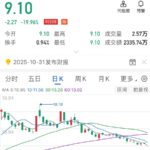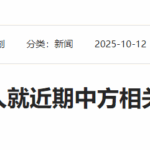Beijing, October 12 – At the invitation of the Workers’ Party of Korea Central Committee and the government of the Democratic People’s Republic of Korea, Chinese Premier Li Qiang led a Chinese party and government delegation to attend the 80th anniversary celebrations of the Workers’ Party of Korea from October 9 to 11, and paid an official friendly visit to North Korea.
This marks the first visit by a Chinese Premier to North Korea in 16 years. The visit represents a continuation of recent frequent interactions between Chinese and North Korean leaders and has drawn widespread international attention.
Last month, North Korean leader Kim Jong Un visited China to attend commemorative activities for the 80th anniversary of the Chinese People’s War of Resistance Against Japanese Aggression and the World Anti-Fascist War. Chinese President Xi Jinping met with Kim Jong Un for the first time in six years, providing direction and vision for further deepening China-North Korea relations. On October 10, Xi sent a congratulatory message to Kim Jong Un on the 80th anniversary of the Workers’ Party of Korea.
During his visit on October 9, Li Qiang stated that the Chinese party and government always view China-North Korea relations from a strategic and long-term perspective, and maintaining, consolidating, and developing the traditional friendly cooperative relationship between China and North Korea remains an unwavering policy.
Kim Jong Un expressed that North Korea-China relations are unbreakable, and regardless of changes in the international situation, consolidating and developing friendly cooperative relations between North Korea and China remains the unwavering position of the North Korean party and government, which aligns with the common interests of both sides and benefits regional peace and stability.
The traditional friendship between China and North Korea originated from the struggle for national independence, was tempered during the Korean War, and has been continuously consolidated and developed throughout the socialist revolution and construction processes of both countries.
This year marks the 75th anniversary of Chinese People’s Volunteers fighting in the Korean War. On October 10, Li Qiang specially visited the Anzhou Chinese People’s Volunteers Martyrs Cemetery to pay tribute to the martyrs.
Both China and North Korea are socialist countries led by communist parties. Currently, both countries are vigorously advancing their socialist construction causes. During talks with North Korean Premier Pak Pong Ju on October 11, Li Qiang pointed out that “China is willing to explore practical cooperation potential with North Korea” and that “both sides should strengthen exchanges and visits in various fields and at all levels, including youth, culture, education, arts, and sports.” Pak Pong Ju stated that North Korea is willing to work with China to “expand friendly exchanges, deepen cooperation in various fields, and cooperate closely on the path to achieving socialist causes.”
China-North Korea economic cooperation has broad prospects. The two countries have maintained exchanges and cooperation in various fields including culture, education, and sports for a long time. Both sides can use this visit as an opportunity to expand exchanges and visits at all levels, deepen mutually beneficial economic and trade cooperation, and promote China-North Korea practical cooperation to new breadth and depth.
Workers’ Party of Korea
The Workers’ Party of Korea is the founding and ruling political party of North Korea, established in 1949 through a merger of earlier communist parties. It is the central institution of the country’s political system, built upon the ideology of Juche (self-reliance) and led by the Kim dynasty, which has maintained absolute control over the state since its inception.
Democratic People’s Republic of Korea
The Democratic People’s Republic of Korea (DPRK), commonly known as North Korea, was established in 1948 following the division of Korea after World War II. It is a single-party state governed by the Workers’ Party of Korea, founded on the national ideology of “Juche” (self-reliance) and led by the Kim dynasty since its inception. The country is known for its isolationist policies, centralized economy, and significant focus on its military capabilities.
Workers’ Party of Korea Central Committee
The Workers’ Party of Korea Central Committee is the leading political body of North Korea’s ruling party, which has held absolute power since the country’s founding. Historically, it has been the central organ for implementing the policies of the Kim dynasty, from Kim Il-sung to the current leader Kim Jong-un. It operates from a large complex in Pyongyang and functions as the primary institution for party administration and ideological control.
Chinese People’s War of Resistance Against Japanese Aggression
The Chinese People’s War of Resistance Against Japanese Aggression (1937-1945) was a major theater of World War II, marking China’s full-scale resistance against Japanese invasion. This brutal conflict resulted in immense Chinese casualties and widespread devastation, forging a powerful sense of national unity. The war’s conclusion following Japan’s surrender in 1945 is a foundational event in modern Chinese history and national identity.
World Anti-Fascist War
The term “World Anti-Fascist War” refers to the global conflict fought from 1939 to 1945, more commonly known as World War II. It was a worldwide military struggle between the Allied powers and the Axis powers, which were fascist states led by Nazi Germany, Fascist Italy, and Imperial Japan. The war concluded with the defeat of the Axis powers, leading to a profound reshaping of the global political order.
Korean War
The Korean War (1950-1953) was a major Cold War conflict that began when North Korean forces, backed by the Soviet Union and China, invaded South Korea, which was supported by a United Nations coalition led by the United States. The war ended in a stalemate with an armistice agreement, not a peace treaty, leaving the Korean Peninsula divided along the Demilitarized Zone (DMZ) and technically still at war.
Anzhou Chinese People’s Volunteers Martyrs Cemetery
The Anzhou Chinese People’s Volunteers Martyrs Cemetery is a memorial site in the Democratic People’s Republic of Korea dedicated to the Chinese soldiers who died during the Korean War (1950-1953). It was established to honor the members of the Chinese People’s Volunteers army who fought alongside North Korean forces. The cemetery serves as a symbol of the historical alliance and shared sacrifice between China and North Korea.
Chinese People’s Volunteers
The Chinese People’s Volunteers (CPV) was the name given to the Chinese military forces that intervened in the Korean War (1950-1953) to support North Korea against the United Nations forces, primarily composed of South Korean and American troops. Officially entering the conflict in October 1950, their involvement marked a significant escalation of the war and demonstrated China’s commitment to its communist ally. The term is now a key part of the historical narrative of the war in China, commemorating the soldiers who fought.





